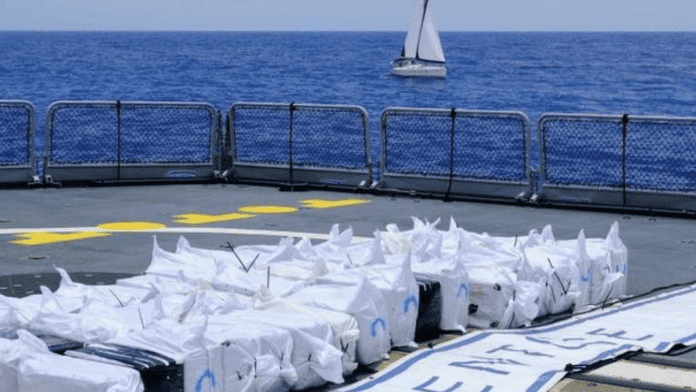News In Brief:
French navy seized 2.4 tons of cocaine from a Venezuelan fishing boat in the Atlantic Ocean, highlighting how the Caribbean region is increasingly being used for drug trafficking from South America to Europe and North America.
The recent seizure of 2.4 tons of cocaine from a Venezuelan fishing boat by the French navy is a significant event with broader implications for global agriculture and farmers, particularly in Africa. While this incident may seem distant from the fields and farms, its effects are felt worldwide.
Cocaine is typically derived from the coca plant, primarily grown in South America, with Colombia producing about 60% of the world’s supply. This abundance has made the Caribbean a critical route for trafficking the product to Europe and North America buyers.
Traffickers use semi-submersible vessels used by drug traffickers to evade detection. However, unlike traditional submarines, they can’t go fully underwater but can still transport large quantities of drugs stealthily.
Relevance to farmers
- Economic impact: The illegal drug trade often competes with legitimate agricultural businesses, affecting the prices and market stability of agricultural products. For instance, traffickers may offer higher prices for logistics and labour, diverting resources from agriculture.
- Resource allocation: Governments may divert resources to combat drug trafficking, which could otherwise be used to support agricultural development. Increased military and law enforcement spending can reduce funds available for agricultural subsidies, infrastructure, and research.
- Environmental damage: The production and trafficking of cocaine can lead to environmental degradation. Forests are often cleared to grow coca plants, affecting biodiversity and soil health. This environmental impact can indirectly affect African farmers who rely on global agricultural ecosystems.
Farmers should consider diversifying their crops and income sources to mitigate risks from market fluctuations caused by external factors like drug trafficking.
There is also a need for strong advocacy to ensure that governments prioritise agricultural development even while addressing drug trafficking issues. Support from agricultural policies and international aid can help bolster the farming sector. Increasing awareness about the broader impacts of drug trafficking on agriculture can help communities understand the importance of supporting anti-trafficking measures.
The fight against drug trafficking is not just a law enforcement issue but a multifaceted challenge impacting various sectors, including agriculture. By understanding these connections, farmers worldwide, especially in Africa, can better navigate the complexities of the global market and advocate for policies that support sustainable agricultural development.



